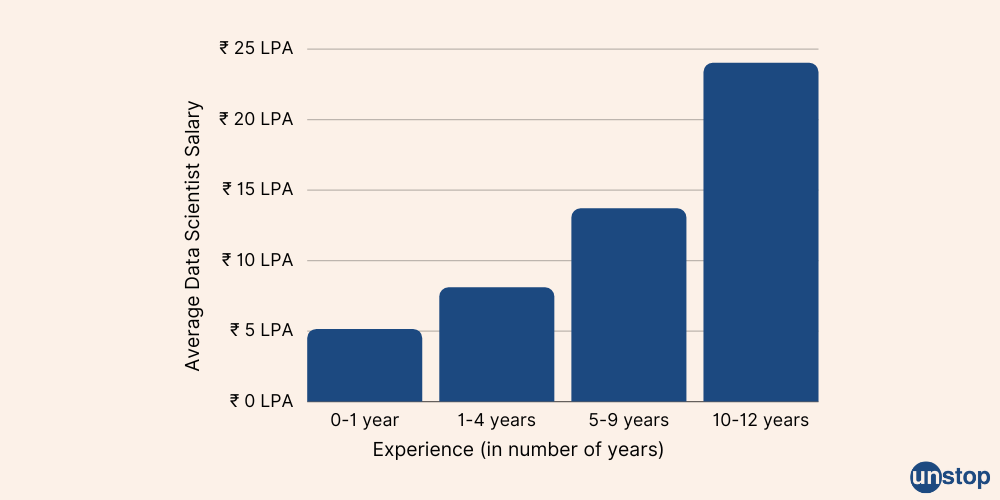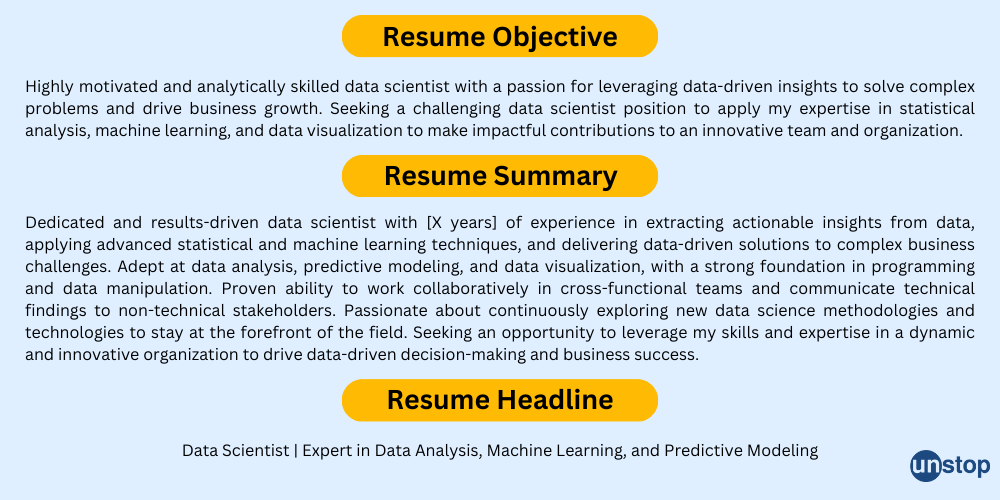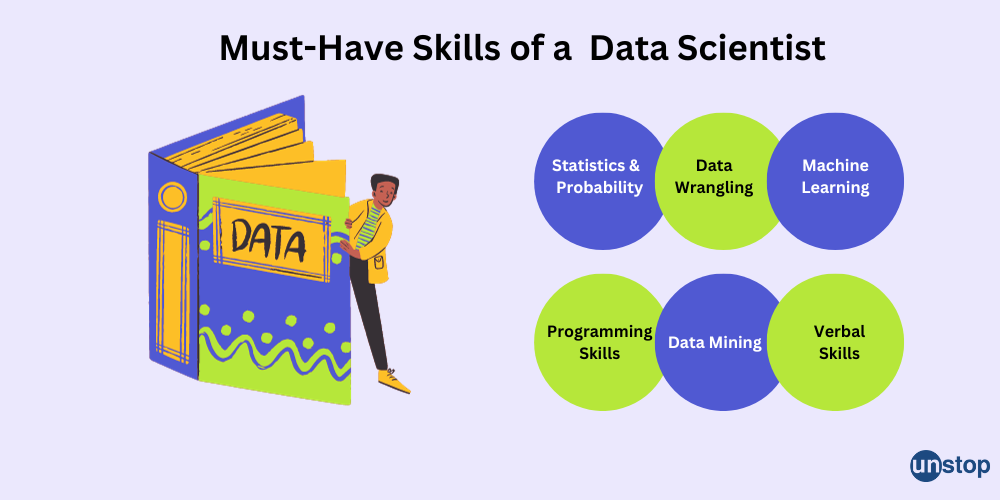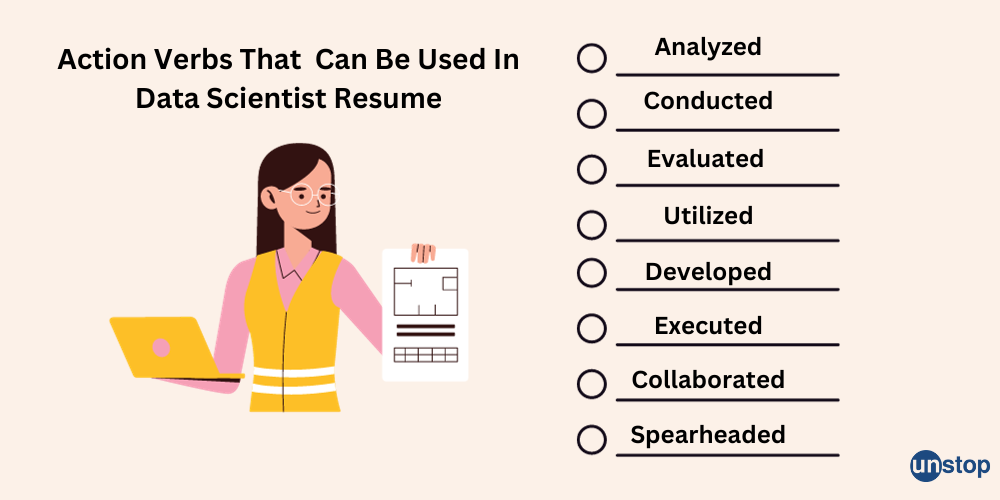- Qualification and Skills to be An Accountant
- Entry-Level Accountant Resume Format | Functional Resume
- Experienced Accountant Resume | Chronological Format
- Senior Accountant Resume (Combination Format)
- How to Write an Effective Accounting Resume
- Frequently Asked Questions (FAQs) on Accountant Resume
- Digital Marketing Resume Format
- Digital Marketing Resume Samples
- Frequently Asked Questions - Digital Marketing
- Business Analyst Resume Template
- Business Analyst Resume: Points To Remember
- Business Analyst Resume Samples
- Frequently Asked Questions
- Top 10 front-end developer resume tips
- Front-end Developer Resume Samples
- Importance of an Effective Data Scientist Resume
- Key Elements of a Data Scientist Resume
- Work Experience Section For Data Scientist Resume
- Importance fo Highlighting Relevant Certifications
- Showcasing Technical Skills and Projects
- Creating a Successful Data Scientist Resume
- Data Scientist Resume Samples
- Conclusion: Writing An Effective Data Scientist Resume
- FAQs
- Must-Have Skills For A Graphic Designer Resume
- Graphic Design Resume: Points To Note
- Structuring Your Resume
- Tailoring Your Graphic Designer CV
- Graphic Designer Resume Samples
- Key Takeaways for Creating an Effective Graphic Designer Resume
- Frequently Asked Questions
- How to Write a Resume for Product Manager: Points To Remember
- 5 Product Manager Resume Samples
- Key Skills for a Java Developer Resume
- Including Relevant Education and Certifications in a Java Developer Resume
- Optimizing Your Java Developer Resume for ATS
- Action Words for an Impressive Java Developer Resume
- Formats for Java Developer Resume
- Examples of Java Developer Resumes
- Frequently Asked Questions about Java Developer Resumes
- Resume for software engineering: Template
- Resume for software engineering: Important Points
- How to write the best resume for a software engineer job?
- Software Engineer Resume Samples
- Key Takeaways
- Data Analyst Resume: What to Include
- Resume Format For Experienced and Entry-Level Data Analysts
- Data Analyst Resume Sample
- Tips for Writing a Data Analyst Resume
Data Scientist Resume For 2026: Learn How To Write [Samples+Tips]
![Data Scientist Resume For 2026: Learn How To Write [Samples+Tips]](https://d8it4huxumps7.cloudfront.net/bites/wp-content/banners/2023/9/650c3b5876256_data_scientist_resume_fi.png?d=1200x800)
A data scientist resume is essential for job candidates in the highly competitive field of data science. It serves as a tool for job applications, showcasing sample resumes and career objectives. A strong resume is crucial in the job application process as it effectively showcases an individual's skills, qualifications, and experiences to potential employers. It helps job candidates stand out and achieve their career objectives. A well-crafted data scientist resume not only highlights key qualifications and relevant expertise in the skills section, but also demonstrates the ability to analyze and interpret complex data.
Let us take a look at everything you should know while writing a data scientist resume.
Want to upgrade your Data Science Skills? Check out this course at Unstop!
Importance of an Effective Data Scientist Resume
Data scientist jobs are highly sought after these days. Offering a good salary and vast scope for career growth, data science has become a hot favorite among professionals. Take a quick look at the salary trend in data science.

Read More: Data Science Salary Trend 2024
So whether you are a fresher looking to explore data science as a career or a highly experienced candidate, your resume is the basic necessity for applying for a job. A good data science resume has the potential to create a strong first impression on hiring managers, showcasing your data science skills and increasing your chances of securing job opportunities and interviews as a data scientist.
The primary role of a resume for a data science job is to showcase your relevant skills and experience in the field of data science. By highlighting your expertise in programming languages such as Python or R, statistical analysis, machine learning algorithms, and data visualization tools like Tableau or Power BI in your resume, you demonstrate your proficiency as a data scientist. Mentioning any certifications or advanced degrees related to data science can further strengthen your resume.
An effective resume acts as a gateway to securing interviews with top companies. By clearly presenting your data science resume, including your accomplishments, projects, and contributions in previous roles, you provide concrete evidence of your abilities. For instance:
-
Increased revenue by 15% through the implementation of predictive analytics models in my data science resume.
-
Developed an automated anomaly detection system for my data science resume that reduced error rates by 20%.
Furthermore, including keywords from the job description can help optimize your resume for applicant tracking systems (ATS), increasing the likelihood of being shortlisted for further consideration.
Crafting an impactful data scientist resume involves organizing information in a clear and concise manner. Utilize bullet points in your data science resume to highlight key achievements and responsibilities while ensuring readability. Remember to quantify results whenever possible:
-
Analyzed large datasets comprising millions of records.
-
Built machine-learning models with over 90% accuracy.
Key Elements of a Data Scientist Resume
Including the right sections in your data scientist resume is crucial. Here are the essential elements to consider:
1. Contact Information
-
-
Include your full name, professional email address, phone number, and data science resume.
-
If applicable, add links to your LinkedIn profile or personal website to enhance your data science resume.
-
2. Impactful Headline, Resume Summary or Resume Objective Statement
-
-
Write a concise resume overview highlighting your expertise and career objective. You can use a resume headline, too.
-
Tailor your resume summary or objective to match the job you're applying for.
-

3. Work Experience
-
-
Detail relevant work experience on your resume, emphasizing data science roles or projects.
-
Highlight achievements, responsibilities, and outcomes using bullet points.
-
4. Education
-
-
List degrees, certifications, and courses related to data science.
-
Mention any academic honors or awards received.
-
5. Skills
-
-
Showcase your data scientist skills on your resume, including technical proficiencies like programming languages (e.g., Python, R), statistical analysis, machine learning algorithms, and database management.
-

6. Certifications
-
-
Specify any relevant certifications such as Certified Data Scientist (CDS) or AWS Certified Machine Learning – Specialty on your resume.
-
Pro Tip: When creating your data scientist resume
-
Use clear headings and subheadings in your resume for each section to enhance readability.
-
Opt for bullet points on your resume instead of lengthy paragraphs to concisely highlight key information.
-
Format the document consistently with appropriate fonts and spacing.
Remember that employers often receive numerous resumes; therefore, organizing information effectively is vital to capture their attention quickly. So whether you are a fresher or a senior data scientist, following these guidelines and focusing on the key elements mentioned above, can help you craft an impressive data scientist resume that stands out from the competition.
Don’t just dream about your ideal career—make it a reality! Explore our data scientist job opportunities listed on Unstop.
Work Experience Section For Data Scientist Resume
Creating an impressive section for work experience is crucial. This section of your resume provides potential employers with valuable insights into your professional background and highlights the impact you have made in previous roles.
To make your experience section stand out, consider the following talking points:
-
Emphasize relevant data science projects completed during previous roles in your resume. Highlight projects that showcase your expertise in data analysis, machine learning, and statistical modeling. Provide concise descriptions of each project on your resume, emphasizing the techniques used and the outcomes achieved.
-
Highlight accomplishments, quantifiable results, and impact made in previous positions on your resume: Employers are interested in tangible results. Use bullet points in your resume to highlight specific achievements such as improving efficiency, reducing costs, or increasing revenue through data-driven insights.
-
Showcase transferable skills gained from non-data science roles or academic projects on your resume: If you have worked in other fields before transitioning to data science or have completed meaningful academic projects related to this field, include them in this section. Demonstrate how your resume and past experiences have equipped you with valuable skills that can be applied to your role as a data scientist.
-
Use action verbs (e.g., "Developed," "Evaluated," "Analyzed") to convey proactive involvement. Whenever possible, quantify your achievements on your resume using numbers or percentages (e.g., "Increased sales on my resume by 20%").

By focusing on these strategies within your resume's work experience section, you can effectively demonstrate your qualifications as a data scientist to potential employers and increase your chances of securing the desired position. Remember to consider other resume sections, such as the education section and cover letter, to provide a comprehensive overview of your skills and experiences.
Importance fo Highlighting Relevant Certifications
Including industry-specific certifications that demonstrate expertise in data science tools or methodologies is crucial for a data scientist resume. These certifications serve as key qualifications, showcasing the candidate's proficiency in essential data science skills, making them stand out on their resume. By including the candidate's resume, potential employers can quickly identify their level of expertise and credentials.
In addition to certifications, it is important to highlight any awards or recognition received for outstanding work in the field on your resume. These accomplishments further enhance the credibility of the candidate's resume as a data scientist. Awards on a resume demonstrate exceptional performance and validate the candidate's abilities, making them stand out among other applicants.
By emphasizing relevant certifications and awards on their resume, a data scientist can capture the attention of hiring managers and recruiters. These resume credentials provide evidence of a strong foundation in data science and increase the chances of being considered for an interview.
When including certifications and awards on a resume, it is essential to follow proper formatting guidelines. Clearly state each qualification or accomplishment on your resume, providing specific information such as dates and institutions involved. Avoid redundancy by focusing on key achievements rather than duplicating responsibilities already mentioned elsewhere in the resume.
Education plays a vital role in establishing credibility as a data scientist candidate. When crafting your resume, ensure that all educational qualifications are listed accurately on your resume, paying attention to spelling and providing necessary details such as degree titles, universities attended, and graduation dates.
Showcasing Technical Skills and Projects
-
List your technical skills prominently in the skills section of your data scientist resume. When creating your resume, make sure to highlight your proficiency in programming languages like Python and R, as well as statistical analysis tools such as SQL. Additionally, mention any experience you have with machine learning frameworks like TensorFlow.
-
Provide details about the data science projects you have undertaken independently or collaboratively on your resume. This will demonstrate your practical application of skills on your resume and showcase your ability to work on real-world problems.
-
Highlight your proficiency in handling large datasets, cleaning data, performing exploratory analysis, and building models. Employers are looking for candidates who can effectively work with data throughout the entire process.
-
Emphasize your expertise in data visualization techniques. Use visuals to present complex information in a clear and concise manner.
-
Mention any relevant computer science courses or certifications you have completed to validate your skills further.
-
If applicable, include any volunteering or hobby projects that demonstrate your passion for data science outside of formal employment.
-
Consider including soft skills that complement your technical abilities. Effective communication, teamwork, and problem-solving are highly valued by employers in addition to hard skills.
By showcasing both your technical skills and projects on your data scientist resume, you will provide potential employers with a comprehensive overview of your abilities and experiences in the field. This will increase your chances of securing exciting data science job interviews.
Creating a Successful Data Scientist Resume
Following the below guidelines will help you write the best resume for data scientist and increase your chances of securing an interview opportunity.
1. Tailoring the resume to match specific job requirements by highlighting relevant skills and experiences
To create a strong resume as a data scientist, it is crucial to tailor it according to the specific job requirements. Highlighting relevant skills and experiences can significantly increase your chances of standing out among other candidates. Consider the following tips:
-
Carefully review the job description and identify key skills and qualifications sought by the employer.
-
Showcase your expertise in data science by emphasizing your proficiency in programming languages such as Python or R, statistical analysis, machine learning algorithms, and data visualization techniques.
-
Include any certifications or advanced degrees related to data science that you have obtained.
2. Adding Skills from the Job Description
When applying for a job, it is important to tailor your resume and cover letter to the specific requirements of the position. One effective way to do this is by adding skills from the job description. By carefully reading the job description and identifying the key skills and qualifications that the employer is seeking, you can highlight those skills in your application materials. This not only shows the employer that you have the necessary skills for the job, but it also demonstrates that you have taken the time to understand the requirements of the position. When adding skills from the job description, be sure to use the same language and terminology that is used in the description.
This will help your application stand out and make it clear to the employer that you are a good fit for the role. Additionally, if you have any additional skills or qualifications that are not mentioned in the job description but are relevant to the position, be sure to include them as well.
3. Focusing on quantifiable achievements rather than just listing responsibilities
When crafting your resume, focus on quantifiable achievements rather than simply listing your responsibilities. This approach helps potential employers understand your impact on their organization. Here's how:
-
Use bullet points to highlight specific projects where you successfully applied data science techniques.
-
Quantify your accomplishments whenever possible. For example, mention how you improved revenue by a certain percentage or reduced processing time for a particular task.
-
Highlight any awards or recognition received for outstanding work in data science.
4. Proofreading and editing the resume to ensure it is error-free and concise
A well-written resume should be error-free and concise. Take these steps to ensure yours meets this criterion:
-
Proofread carefully for grammar, spelling, and punctuation errors.
-
Keep sentences short and focused on conveying information effectively.
-
Remove any unnecessary details or irrelevant experiences that do not align with the required skills for the position.
-
Utilize action verbs when describing your achievements.
Data Scientist Resume Samples
Following are some data scientist resume samples for your reference.
Sample 1: Fresher Data Scientist Resume Sample
[Your Name]
[Your Address]
[Your Email Address]
[Your Phone Number]
[LinkedIn Profile]
Objective:
Aspiring data scientist with a strong foundation in data analysis, statistical modeling, and machine learning. Seeking an entry-level position to apply my analytical skills and passion for uncovering actionable insights from data.
Education:
Bachelor of Science in Statistics
[University Name]
[Location]
[Month Year of Graduation]
Relevant Courses:
- Data Analysis and Visualization
- Statistical Inference
- Machine Learning Fundamentals
- Database Management
- Python Programming for Data Science
Skills:
- Data Analysis: Python (pandas, numpy), R
- Machine Learning: scikit-learn, TensorFlow
- Data Visualization: Matplotlib, Seaborn, Tableau
- Statistical Analysis: Hypothesis testing, Regression analysis
- Database Tools: SQL
- Data Preprocessing: Data cleaning, feature engineering
- Tools: Jupyter Notebook, Git
Projects:
1. Customer Churn Prediction
- Developed a machine learning model to predict customer churn for a telecom company.
- Analyzed customer data and identified key factors influencing churn.
- Achieved a predictive accuracy of 85% using logistic regression.
2. Movie Recommendation System
- Built a movie recommendation system using collaborative filtering.
- Implemented matrix factorization techniques to improve recommendation accuracy.
- Utilized Python and pandas for data preprocessing and model evaluation.
3. Market Basket Analysis
- Conducted market basket analysis on retail transaction data.
- Identified frequent itemsets and association rules to optimize product placement.
- Used Python and Apriori algorithm for analysis.
Certifications:
- [Any relevant certifications, e.g., "Data Science Specialization on Coursera"]
Honors and Awards:
- [Any academic honors or awards you have received]
Languages:
- Fluent in English and [mention any other languages if applicable]
Sample 2: Data Scientist Resume for Candidates With Mid-Level Experience
[Your Name]
[Your Address]
[Your Email Address]
[Your Phone Number]
[LinkedIn Profile]
Professional Summary:
Experienced data scientist with [X years] of hands-on experience in data analysis, machine learning, and predictive modeling. Proven track record of delivering data-driven insights and solutions to drive business growth.
Work Experience:
[Previous Job Title] - [Current/Former Company] - [City, State] - [Dates of Employment]
- Led a team of data analysts in designing and implementing data-driven solutions for [specific projects].
- Developed and deployed machine learning models to optimize marketing campaigns, resulting in a 15% increase in customer conversion rates.
- Conducted exploratory data analysis (EDA) and feature engineering to uncover actionable insights from large datasets.
- Collaborated with cross-functional teams to define project objectives and deliver data-driven recommendations.
- Utilized data visualization tools to create interactive dashboards and reports for stakeholders.
[Previous Job Title] - [Current/Former Company] - [City, State] - [Dates of Employment]
- Developed and maintained predictive models for credit risk assessment.
- Conducted advanced statistical analysis to assess model performance and accuracy.
- Implemented data preprocessing pipelines to handle missing values and outliers.
- Collaborated with business teams to translate analytical findings into actionable strategies.
- Presented data-driven insights to senior leadership to inform decision-making.
Education:
Master of Science in Data Science
[University Name]
[Location]
[Month Year of Graduation]
Bachelor of Science in Statistics
[University Name]
[Location]
[Month Year of Graduation]
Skills:
- Data Analysis: Python (pandas, numpy), R
- Machine Learning: scikit-learn, XGBoost, TensorFlow
- Data Visualization: Matplotlib, Seaborn, Tableau
- Statistical Analysis: Hypothesis testing, Regression analysis
- Database Tools: SQL
- Big Data Tools: Hadoop, Spark
- Data Preprocessing: Data cleaning, feature engineering
- Tools: Jupyter Notebook, Git
Certifications:
- [Any relevant certifications, e.g., "Certified Data Scientist (CDS)"]
Languages:
- Fluent in English and [mention any other languages if applicable]
Sample 3: Data Scientist Resume for Experienced Candidates
[Your Name]
[Your Address]
[Your Email Address]
[Your Phone Number]
[LinkedIn Profile]
Professional Summary:
Accomplished data scientist with over [X years] of experience in leading data science initiatives and driving data-driven decision-making. Proven ability to develop and deploy advanced machine learning models and lead high-performing teams.
Work Experience:
[Previous Job Title] - [Current/Former Company] - [City, State] - [Dates of Employment]
- Led the data science department, overseeing a team of [X] data scientists and analysts.
- Spearheaded the development of predictive maintenance models for manufacturing equipment, reducing downtime by 25%.
- Collaborated with C-suite executives to define the data science strategy and roadmap.
- Implemented advanced analytics solutions using big data technologies such as Hadoop and Spark.
- Mentored junior data scientists and provided technical leadership and guidance.
[Previous Job Title] - [Current/Former Company] - [City, State] - [Dates of Employment]
- Developed and deployed recommendation systems for a large e-commerce platform, resulting in a 20% increase in sales.
- Designed and executed A/B tests to evaluate the impact of data-driven recommendations on user engagement.
- Implemented natural language processing (NLP) techniques to analyze customer reviews and feedback.
- Presented data-driven insights to external clients and stakeholders to drive strategic decisions.
Education:
Ph.D. in Data Science
[University Name]
[Location]
[Month Year of Graduation]
Master of Science in Data Science
[University Name]
[Location]
[Month Year of Graduation]
Skills:
- Data Analysis: Python (pandas, numpy), R
- Machine Learning: scikit-learn, XGBoost, TensorFlow
- Deep Learning: Keras, PyTorch
- Data Visualization: Matplotlib, Seaborn, Tableau
- Statistical Analysis: Hypothesis testing, Regression analysis
- Big Data Tools: Hadoop, Spark
- Cloud Platforms: AWS, Azure
- Data Preprocessing: Data cleaning, feature engineering
- Tools: Jupyter Notebook, Git
Certifications:
- [Any relevant certifications, e.g., 'Certified Data Scientist (CDS)']
Languages:
- Fluent in English and [mention any other languages if applicable]
Conclusion: Writing An Effective Data Scientist Resume
In conclusion, crafting an effective data scientist resume is crucial for standing out in a competitive job market. A well-written resume highlights your skills and experience and showcases your ability to analyze and interpret complex data. Following the key elements discussed above, you can create the best resume for data scientist positions. Highlighting relevant certifications and awards demonstrates your commitment to professional development and adds credibility to your resume. Lastly, showcasing technical skills and projects provides concrete examples of how you have applied your expertise in real-world scenarios.
To maximize the impact of your data scientist resume, remember to tailor it to each specific job application by emphasizing relevant skills and experiences. Keep it concise yet informative, using bullet points to highlight key achievements. Proofread carefully for any grammatical or spelling errors before submitting it. Finally, consider seeking feedback from mentors or industry professionals to ensure your resume effectively communicates everything.
Your dream internship is just a click away. Start applying now!
FAQs
1. How long should my data scientist resume be?
Ideally, data science resumes need to be one to two pages long. They should provide enough information about your skills, experience, and qualifications without overwhelming the reader with unnecessary details.
2. Should I include a summary or objective statement in my data scientist resume?
Including a summary or objective statement at the beginning of your data scientist resume can help recruiters quickly understand your career goals and qualifications. However, make sure it is concise and tailored to the specific job you are applying for.
3. Can I include non-technical work experience on my data scientist resume?
Yes! While technical skills are essential for a data scientist role, non-technical work experience can put the spotlight on transferable skills. These include communication, leadership, and problem-solving abilities that are valuable in any profession.
4. How important is it to include relevant certifications on my data scientist resume?
Including relevant certifications on your data scientist resume can showcase your commitment to professional development and validate your skills. It can also help you stand out among other candidates.
5. Should I include references in my data scientist resume?
It is not necessary to include references in your data scientist resume. Instead, have a separate reference list ready that you can provide upon request during the interview process.
6. What kind of resume template should I use?
You should use a resume template that is clean, professional, and easy to read. Avoid using overly flashy or cluttered templates, as they can distract from the content of your resume. Choose a template that highlights your skills and experience in a clear and organized manner.
Suggested Reads:
As a biotechnologist-turned-writer, I love turning complex ideas into meaningful stories that inform and inspire. Outside of writing, I enjoy cooking, reading, and travelling, each giving me fresh perspectives and inspiration for my work.
Login to continue reading
And access exclusive content, personalized recommendations, and career-boosting opportunities.
Subscribe
to our newsletter
![Data Scientist Resume For 2026: Learn How To Write [Samples+Tips]](https://d8it4huxumps7.cloudfront.net/uploads/images/67e567129ac07_1.jpg?d=2000x2000)











Comments
Add comment